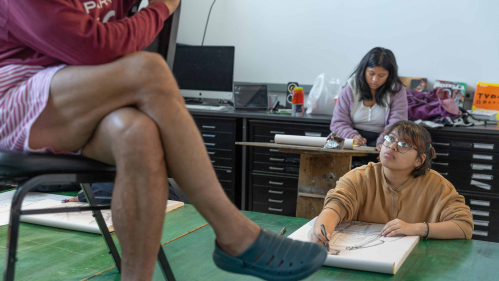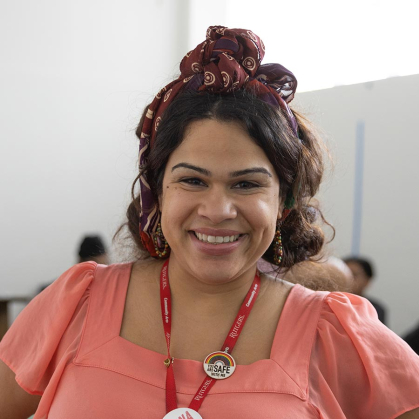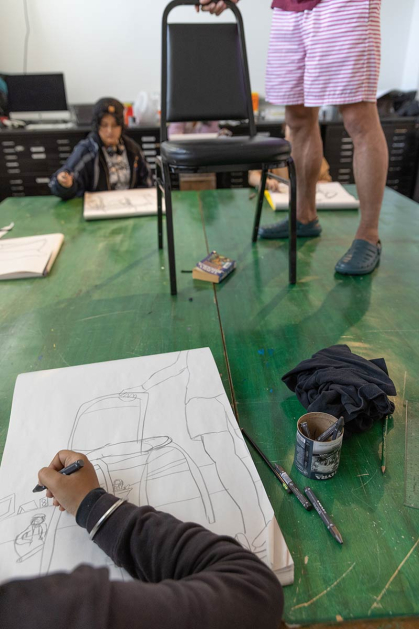Rutgers Helps Budding High School Artists Build Their Portfolios

The community outreach division of the Mason Gross School of the Arts partners with Middlesex County to help underserved high schoolers develop art résumés
Becoming an artist means honing your craft and focusing on your creative vision. When applying to an art school or a job, it also means submitting a portfolio highlighting samples of your work.
“Think of it as your résumé,” said Jade Cintrón Báez, the director of Rutgers Community Arts, the community outreach division of the Mason Gross School of the Arts at Rutgers University–New Brunswick.
Building a portfolio can prove a costly, time-consuming and difficult endeavor, especially for high school students who live in underserved communities and may not have the resources available to develop one. That is why Mason Gross has partnered with the Arts Institute of Middlesex County to provide a free portfolio development program for students at New Brunswick High School and Carteret High School.
“The portfolio development program gives local high school students an actual seat at the table making work within a university arts environment,” said Marc Handelman, chair of the Department of Art and Design at Mason Gross. “Students gain focused skills in a range of new media, materials and disciplines, both traditional and digital in nature.”
Handelman said the program is important “because it helps break down the barriers to higher education and begins to demystify both college and an art education within it.”

Cintrón Báez, a Rutgers alumna who earned a bachelor of arts degree in theater arts and journalism and media studies in 2009, said the students might not otherwise have access to the resources and level of instruction offered.
“So, they're learning that next level of painting,” she said. “They're learning that next level of typography. They're getting to do portrait lighting. They're getting to learn how to assemble a portfolio and apply to schools.”
Every Monday and Wednesday afternoon since Sept. 27, about 15 students from both schools are transported by bus to Civic Square Building in downtown New Brunswick, home of the Mason Gross filmmaking and art and design programs, where they take a variety of art classes. After coffee, snacks and a bit of socializing, the budding artists attend class – which, depending on the day, could be figure drawing, oil painting, digital photography or typography and design – taught by Mason Gross graduate and alumni lecturers from 3:30 p.m. to 6 p.m.
The high schoolers get to meet and speak with professional artists, Mason Gross students and Rutgers admissions staff about what a pathway toward collegiate study might look like, Cintrón Báez added.
Genesis Rosales, a 17-year-old senior at New Brunswick High School who is considering applying to Mason Gross and other art schools, said the portfolio development program opened her eyes to why arts education is important and allowed her to try working with new media. Rosales enjoys painting and drawing with pastels and said making art is “a way for me just to experiment and understand the world around me, my perceptions and how I'd like to see it.”

“I learned new things that I didn't know existed, like typography, and it's challenged me a bit,” said Rosales, adding she is interested in possibly becoming a creative or art director. “I don't do digital art, but learning the skills and everything, it made me actually interested in wanting to branch off into that for a bit.”
Carteret High School junior Gursimar Singh, who especially enjoys the drawing fundamentals class, called the program a very good opportunity that has sharpened and expanded his skills.
“I experimented a lot with different mediums, different techniques, and I learned a lot,” the 16-year-old said. “Now I am more confident with different mediums and so, yeah, when I'm going to choose college, this program will definitely help me. Plus, I will also have a portfolio by then.”
Transportation to Mason Gross and art supplies are included for the students, who also receive a portfolio case. The program culminates in an exhibition of artwork by Carteret and New Brunswick students in Room 227 at Civic Square, 33 Livingston Ave., from 6 p.m. to 7 p.m. on Nov. 29.
The world needs art, Cintrón Báez said.
“Pursuing the arts is a viable career because every day we’re consuming art,” she said. “Every second of every day. It's all around us. We're constantly consuming it, and somebody has to make it. Somebody has to make this world not gray.”
Cintrón Báez said the Arts Institute of Middlesex County – which provides grants for projects and programs tied to arts, culture and history – began working with Mason Gross faculty and staff in the fall of 2022.
Last year, the pilot program targeted advanced placement art students at New Brunswick High School and held art classes on Saturdays. Now in its second year, the high school portfolio development program has shifted to an afterschool schedule. It also has been expanded to include students from Carteret High School.
Pursuing the arts is a viable career because every day we’re consuming art. Every second of every day. It's all around us. We're constantly consuming it, and somebody has to make it. Somebody has to make this world not gray.
Jade Cintrón Báez
Director of Rutgers Community Arts
The goals are many, said Jared Cardenas, who heads education, outreach and administration for the Arts Institute of Middlesex County, which provided funding for the program.
“The No. 1 base-level thing we want is for students to have something enjoyable that extends beyond their school day and enhances skills that they're interested in developing, because no matter what they do next, that's worthwhile,” Cardenas said. “No. 2, the more targeted goal of the program is to reach students who are interested in pursuing art and provide them meaningful, tangible support and resources. So, that's skills, that's materials, that's information, that's connections and networking.”
Cardenas said the information isn’t just for the students, but their parents and guardians, too.
“Lots of parents have reservations about their students going to school for art and understandably so,” he said. “If you don't have this kind of support and information and network, it can be really hard.”
Cardenas added the program encourages high school students to think about whether they want to pursue an education in the arts, and if so, what steps to take.
There is an artist within all of us, Cintrón Báez said.
“If nothing else, the arts can supplement and complement other majors, other career paths,” she said. “The arts can be a tool. So, even taking these classes ... can help inform other areas of study.”